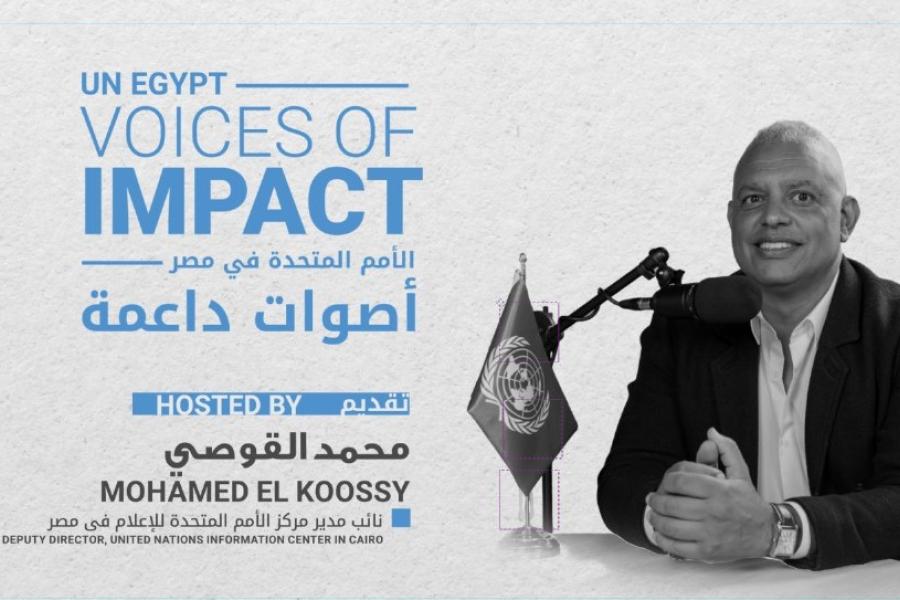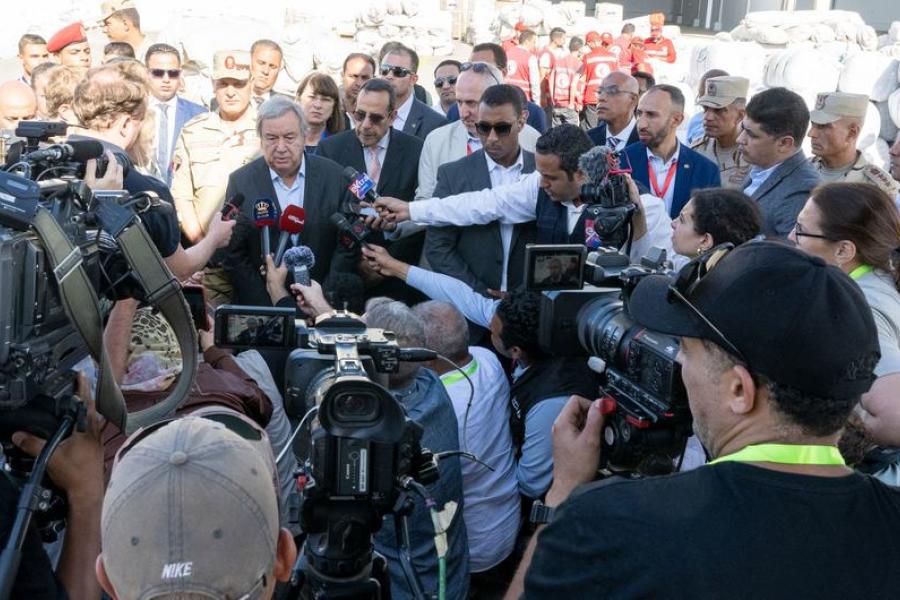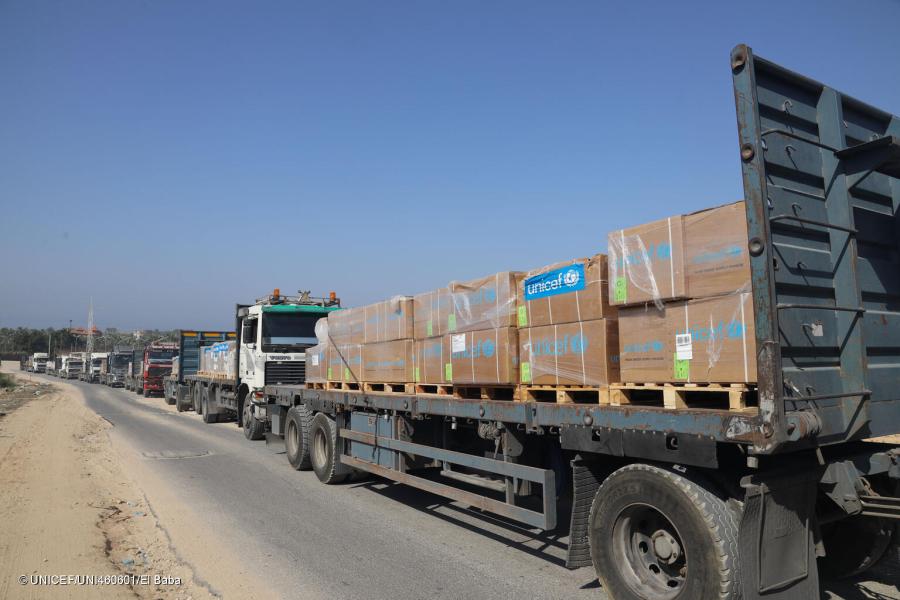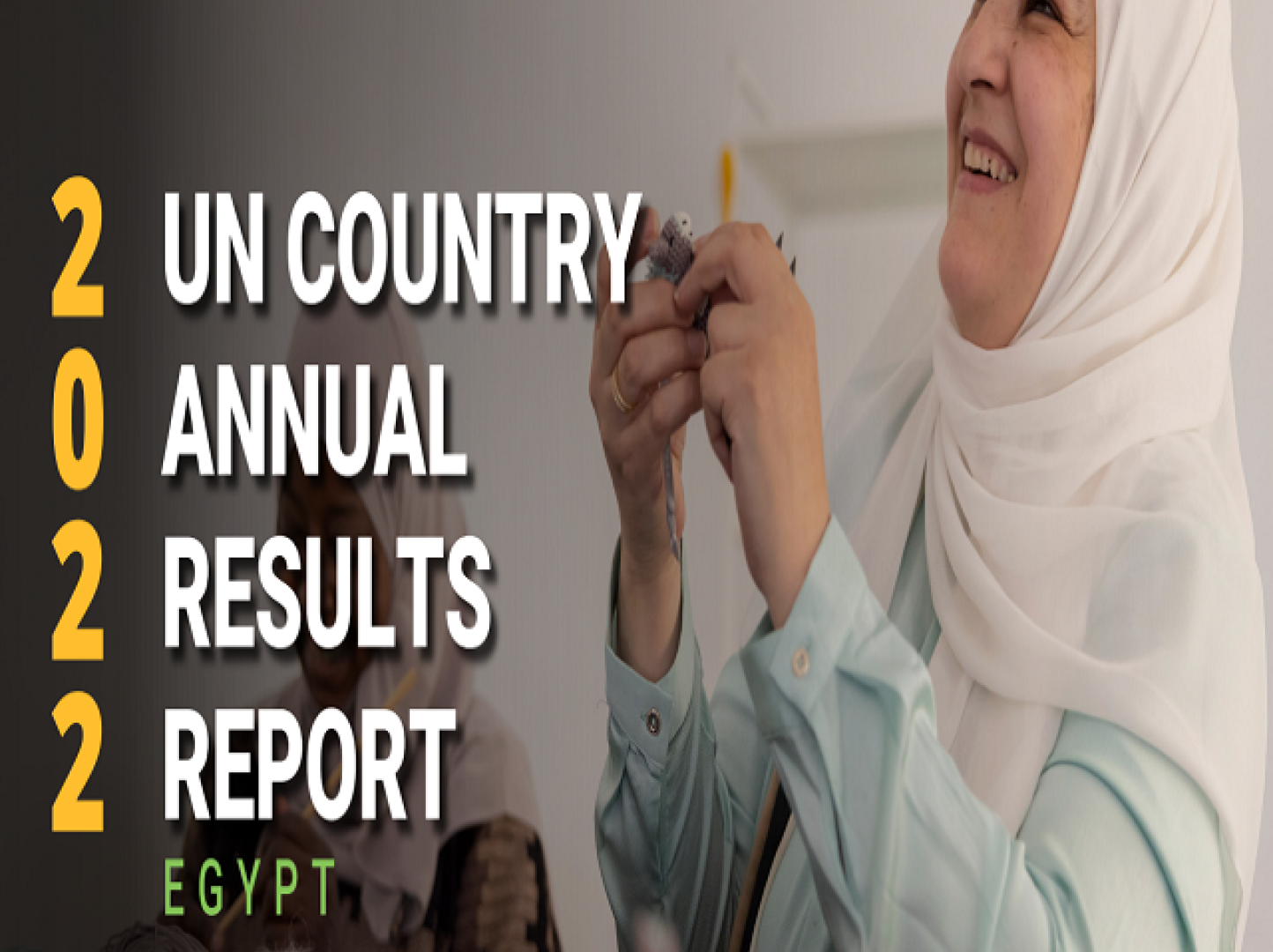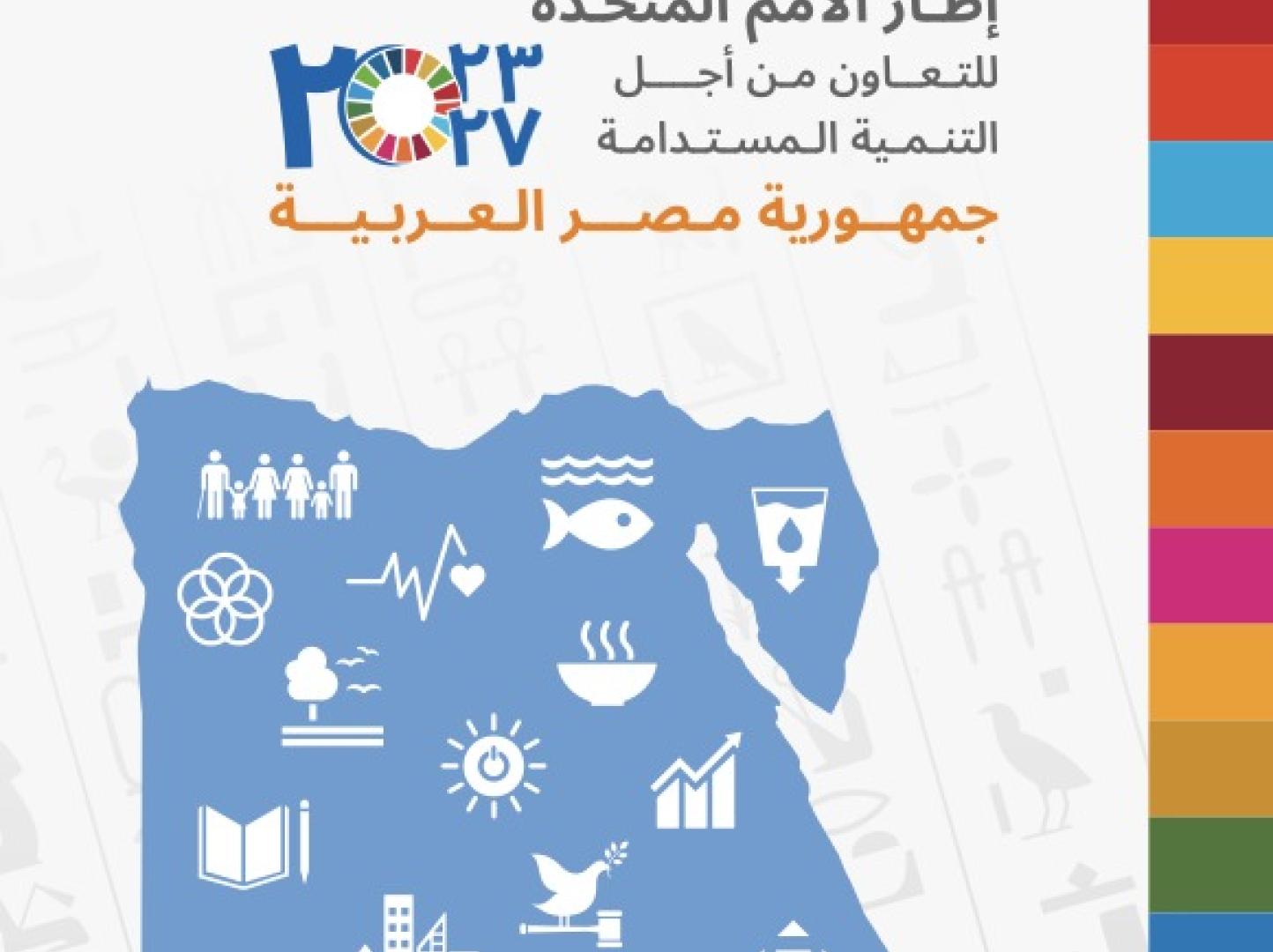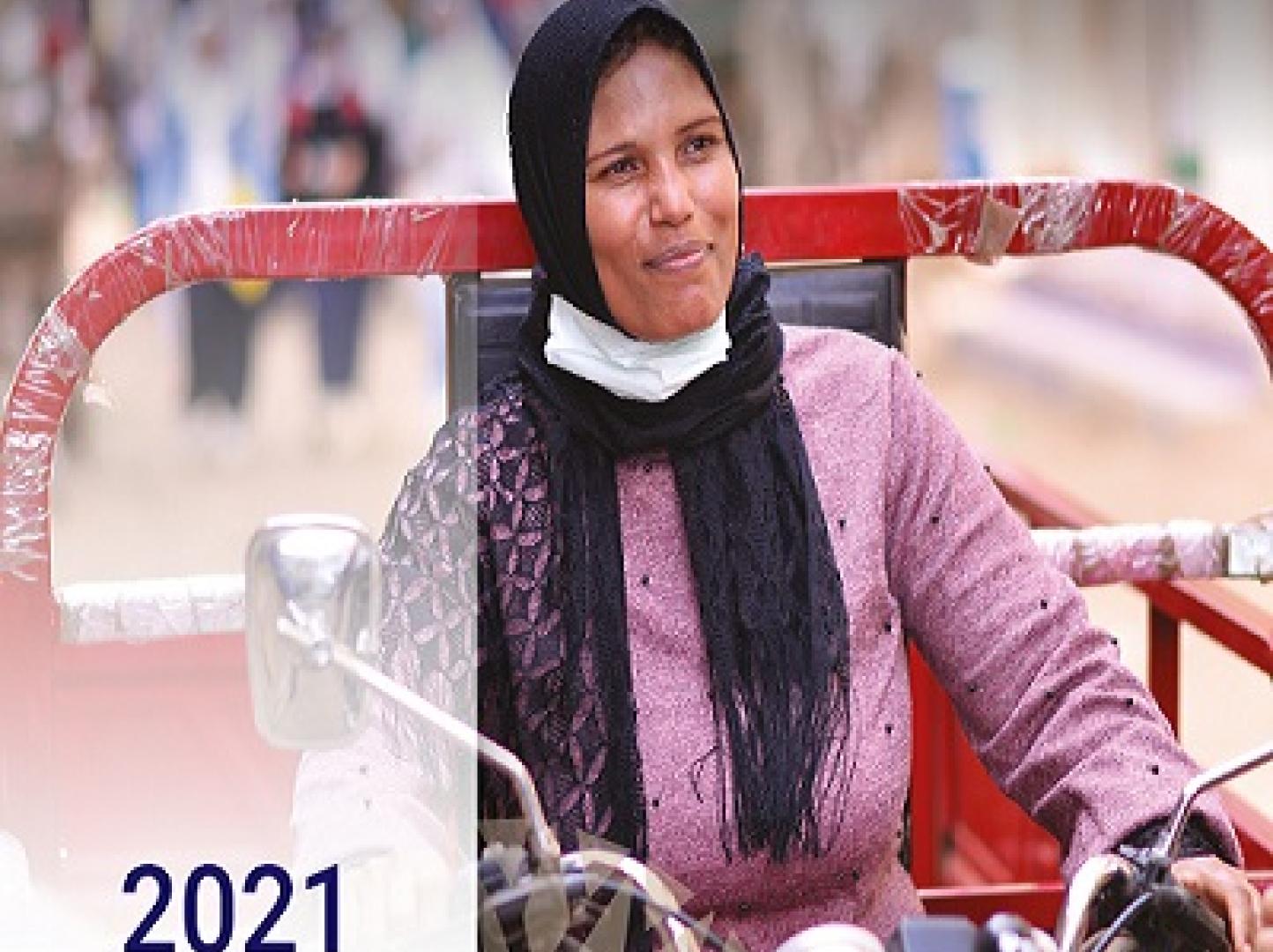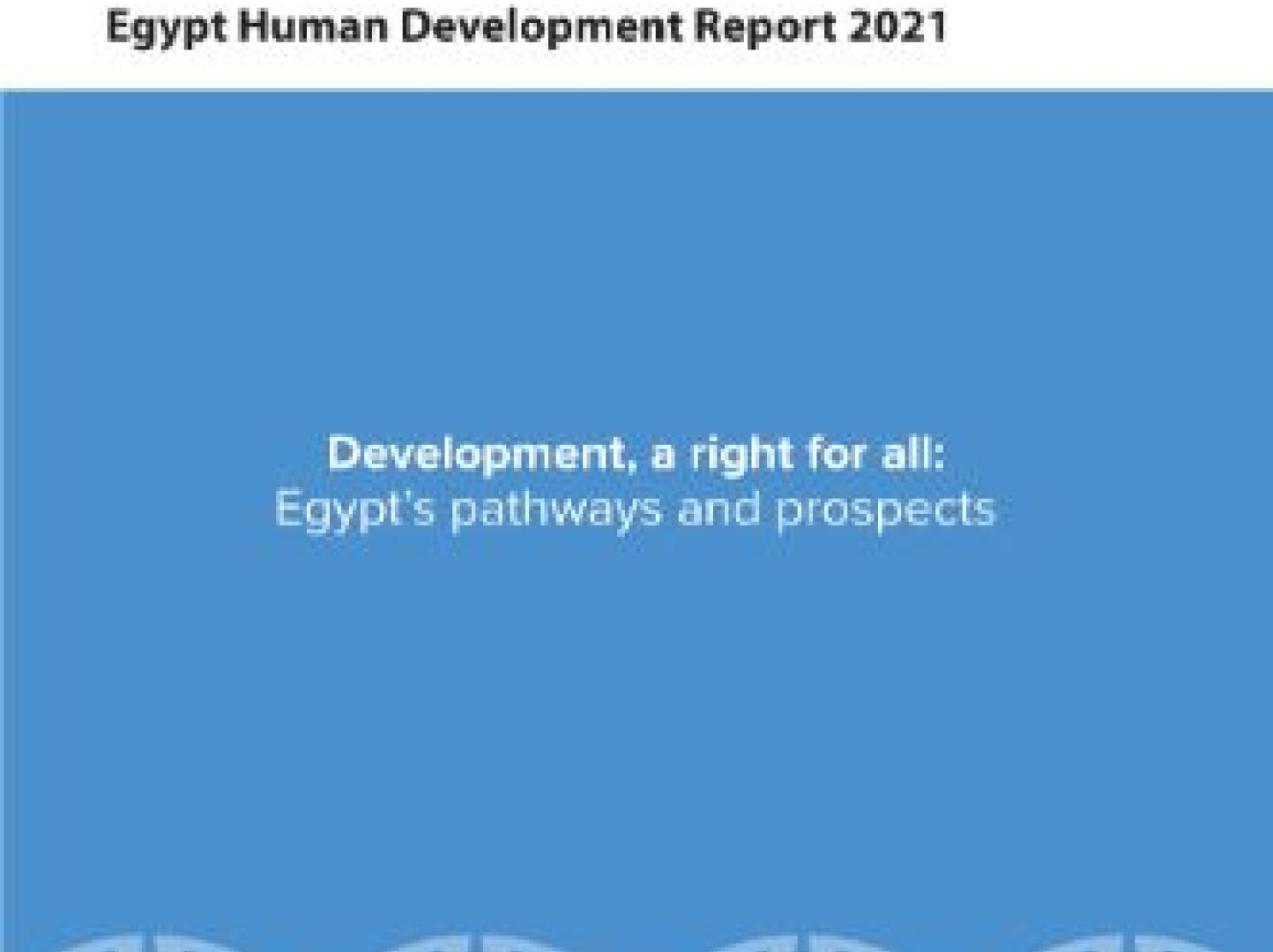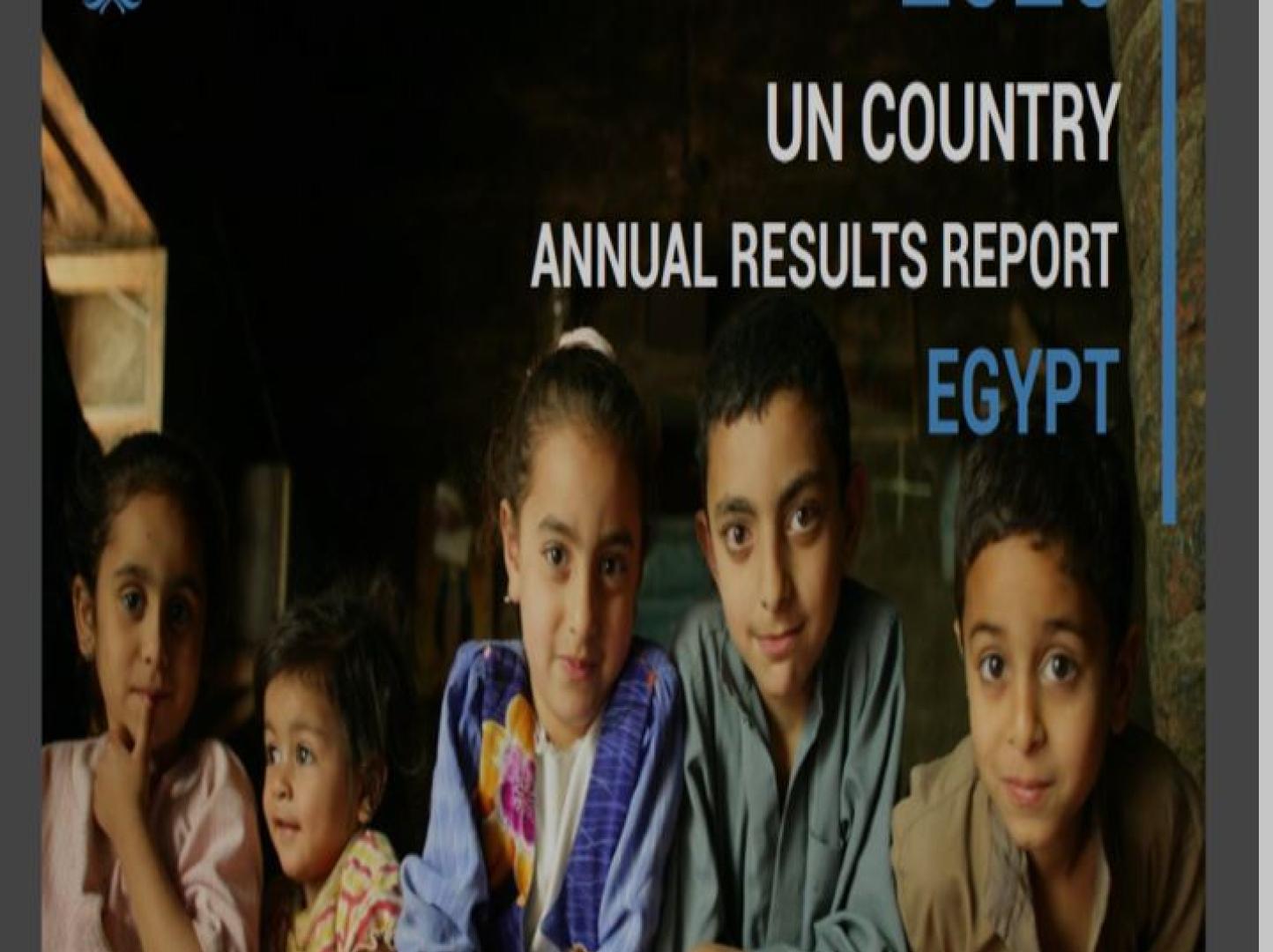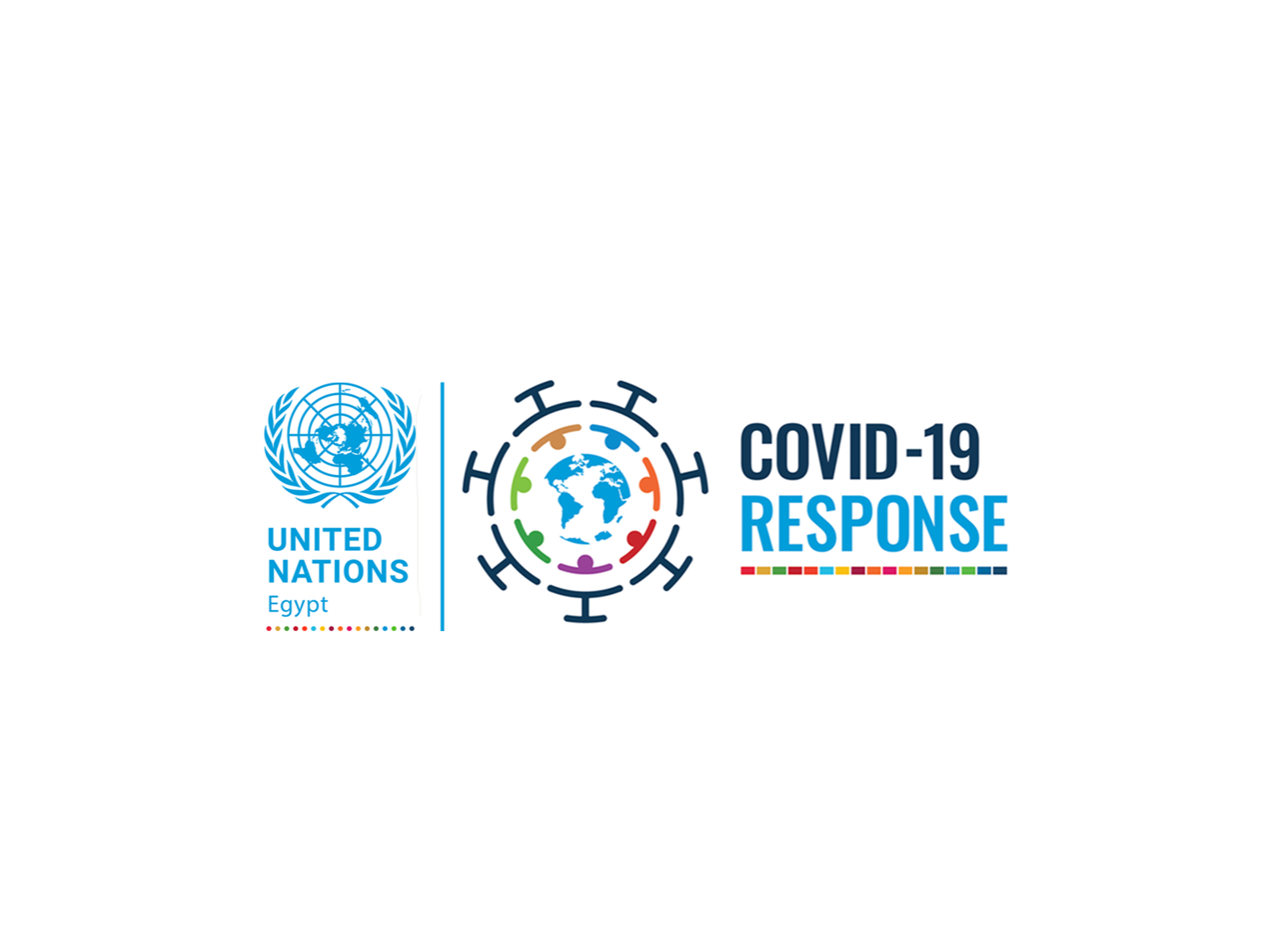Latest
Story
26 April 2024
UN deputy chief encourages RC solidarity with African youth for SDG acceleration
Learn more
Press Release
24 April 2024
THE SECRETARY-GENERAL -- MESSAGE ON THE INTERNATIONAL DAY OF MULTILATERALISM AND DIPLOMACY FOR PEACE 24 April 2024
Learn more
Press Release
23 April 2024
WFP AND EU FORGE NEW PARTNERSHIP TO EMPOWER REFUGEES AND HOST COMMUNITIES IN EGYPT
Learn more
Latest
The Sustainable Development Goals in Egypt
The Sustainable Development Goals are a global call to action to end poverty, protect the earth’s environment and climate, and ensure that people everywhere can enjoy peace and prosperity. These are the goals the UN is working on in Egypt:
Story
15 May 2023
مصر والأمم المتحدة تبدآن رحلة طموحة لتحقيق وعد 2030 بتوقيع إطار جديد للتعاون
برعاية وحضور رئيس مجلس الوزراء، د. مصطفى مدبولي، وقعت الحكومة المصرية وفريق الأمم المتحدة القطري في مصر اتفاقا في التاسع من مايو، لتدشين مرحلة جديدة من التعاون المشترك من أجل تحقيق وعد خطة 2030 للتنمية المستدامة في مصر.
يُمثل إطار الأمم المتحدة الأمم المتحدة للتعاون من أجل التنمية المستدامة الأداة الاستراتيجية التي تسترشد بها جهود تحقيق أهداف التنمية المستدامة. ومن خلال التركيز على أربع أولويات استراتيجية وطنية، تشمل تحقيق التماسك الاجتماعي وتحسين رأس المال البشر، والوصول إلى اقتصاد تنافسي وشامل ومستدام بيئيا، والإدارة المستدامة للموارد الطبيعية، والشفافية والحوكمة الرشيدة وسيادة القانون، تستهدف مصر والأمم المتحدة من خلال إطار التعاون الجديد إلى تحقيق تقدم كبير نحو تحقيق أهداف التنمية المستدامة بحلول 2027.
وفي فعالية تميزت بمشاركة حكومية وأممية رفيعة المستوى، قامت معالي د. رانيا المشاط، وزيرة التعاون الدولي، بالإنابة عن حكومة جمهورية مصر العربية، والسيدة إلينا بانوفا، المُنسقة المُقيمة للأمم المتحدة في مصر، بالإنابة عن فريق الأمم المتحدة القُطري في جمهورية مصر العربية، ليكون التوقيع بمثابة إعلان التزام من جانب فريق الأمم المتحدة القُطري في جمهورية مصر العربية والحكومة المصرية إزاء الأولويات والنتائج الاستراتيجية الواردة بإطار التعاون.
بدأت الفعالية بعرض فيلم وثائقي يُسلط الضوء على أوجه الشراكة بين مصر والأمم المتحدة والتي تعكسها مشروعات تنموية متنوعة تركز على محاور رئيسية هي الناس والكوكب والازدهار والحوكمة، إضافة إلى النساء والفتيات.
وقال الدكتور مصطفى مدبولي إن فعالية توقيع إطار التعاون الجديد "تعد بمثابة تتويج لعلاقات مصر الإنمائية مع أحد أهم شركاء التنمية وأكثرهم تنوعًا وتأثيراً، وهي منظمة الأمم المتحدة والوكالات الأممية المتخصصة، والتي تربطنا بها علاقات تاريخية تنظمها مبادئ راسخة للعلاقات الدولية نصّ عليها ميثاق الأمم المتحدة،" مؤكدا أن مصر تعتز بكونها إحدى الدول المؤسسة لهذه المنظمة العريقة عام 1945.
وقال مدبولي إنه لا يمكن تحقيق التنمية المستدامة بدون قطاع خاص ديناميكي وتنافسي، مضيفا أن مصر أحرزت تقدمًا كبيرًا خلال الأعوام الماضية بمشاركة شركائها في التنمية في معالجة العديد من التحديات الإنمائية على المستوى القُطري. كما أشار إلى أن مصر تنفذ برنامج إصلاح اقتصادي وفقا لمراحل متتالية بدعم من شركاء مصر في التنمية، تضمن تدابير للحماية الاجتماعية تستهدف الفئات الأكثر احتياجًا.
ويعكس إطار التعاون، كما قالت نائبة الأمين العام للأمم المتحدة، السيدة أمينة محمد، في كلمة بالفيديو إلى الاحتفالية، الطبيعة المتكاملة لأهداف التنمية المستدامة، مضيفة أن "العمل المناخي الذي يأتي في صميم (إطار التعاون) يظهر أن قيادة مصر على المسرح العالمي وفي المؤتمر السابع والعشرون للأطراف في اتفاقية الأمم المتحدة الإطارية بشأن تغير المناخ COP27 الأخير يسير جنبًا إلى جنب مع الطمح بداخله."
وشددت نائبة الأمين العام على الحاجة على تضافر جميع الجهود من أجل إحداث "تحول حقيقي"، قائلة، "يجب أن نطرح برامج واسعة النطاق لدفع التحولات الحاسمة في أهداف التنمية المستدامة - من الطاقة إلى أنظمة الغذاء، إلى التكنولوجيا الرقمية والحماية الاجتماعية والتعليم - وجعل التزامنا حقيقيًا بأهداف التنمية المستدامة."
وسيتحدد إحراز تقدم كبير بحلول 2027 نحو تحقيق التنمية المستدامة على ضوء استخدام العديد من مؤشرات الأداء والأهداف من خلال التعاون بين وكالات الأمم المتحدة والشركاء الحكوميين وأصحاب المصلحة المعنيين. يُعزز إطار التعاون المُسائلة ويهدف إلى زيادة الشفافية بشأن الجهود الإنمائية الجارية في مصر.
وقالت د. رانيا المشاط، وزيرة التعاون الدولي، إن "الإطار الاستراتيجي للشراكة مع الأمم المتحدة 2023-2027، ومراحل إعداده على مدار عامين بالشراكة مع مختلف الأطراف من الوزارات والهيئات الاقتصادية والقطاع الخاص والمنظمات غير الحكومية وشركاء التنمية، يعكس ملكية الدولة وشمول عملية تصميم الإطار، مما يمهد الطريق لمرحلة جديدة من الشراكة البناءة مع الأمم المتحدة."
ونبهت المشاط إلى أنه عبر دمج الأولويات الوطنية واتساقًا مع أهداف التنمية المستدامة 2030 يعمل الإطار الجديد على تعزيز الحماية الاجتماعية والتنمية الشاملة، والقدرة على التكيف مع التغيرات المناخية، وتعزيز الشفافية والحوكمة، والتمكين الاقتصادي والاجتماعي للمرأة. وإنني أتطلع لتنفيذ ناجح خلال السنوات المقبلة بالتعاون مع المنسق المقيم للأمم المتحدة".
وبدورها، قالت السيدة إلينا بانوفا، المُنسقة المُقيمة للأمم المتحدة في مصر، إن "إطار التعاون يرتكز على الأولويات التنموية الوطنية ورؤية مصر 2030. دقت ساعة العمل للوفاء بوعد أهداف التنمية المستدامة وعدم ترك أحد خلف الركب. ستقوم الأمم المتحدة ببناء الشراكات وتعبئة كامل مواردها بما في ذلك التحليل والمشورة السياساتية وتوجيه المساعدة إلى من يحتاجون إليها."
ويرتكز الجيل الجديد من أطر التعاون على التقييم والتحليل الجماعي لمنظومة الأمم المتحدة المعنى برصد مناحي التقدم والفجوات والفرص المتاحة مقارنة بالتزام الدولة بتحقيق أهداف التنمية المستدامة وقواعد ومعايير الأمم المتحدة ومبادئ ميثاق الأمم المتحدة. ويحدد هذا التحليل المجموعات الرئيسية المعرضة لخطر التخلف عن الركب والتي تم الحاقها بهذا الإطار.
وبهذه الطريقة، يمثل إطار التعاون التزامًا تجاه الشعب المصري، كما قالت السيدة بانوفا، ولا سيما الفئات الأكثر تهميشًا وضعفًا.
1 of 4
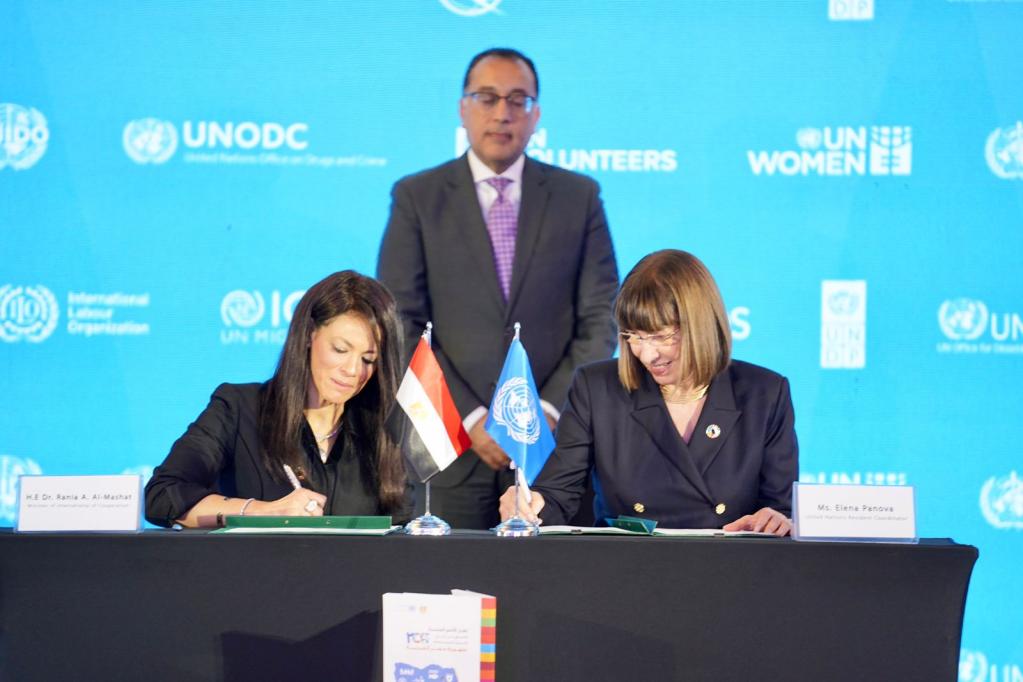
Story
18 July 2023
75th Anniversary of Peacekeeping celebrated in Egypt
Cairo, Egypt - The Egyptian Ministry of Foreign Affairs and the UN in Egypt celebrated the 75th anniversary of UN Peacekeeping on Monday, 17 July, with a high-level event taking place at the Ministry’s premises in Cairo, reflecting high recognition of peacekeepers ’extraordinary contributions to international peace and security.
Attended by the Egyptian Assistant Minister of Foreign Affairs for Multilateral Affairs and International Security Ambassador Ihab Badawi, the UN Resident Coordinator in Egypt, Elena Panova and a wide range of members of the diplomatic community in Egypt along with Egyptian female and male peacekeepers and their families, the event provided an opportunity to honor the service and sacrifice of Egyptian women and men in peacekeeping.
The celebration started with a screening of the UN Secretary-General’s message on Peacekeeping Day 2023, in which he honoured peacekeepers extraordinary contributions to international peace and security and expressed his sympathy and solidarity with their families, friends and colleagues. “United Nations peacekeepers are the beating heart of our commitment to a more peaceful world. For 75 years, they have supported people and communities rocked by conflict and upheaval across the globe,” the Secretary-General said. “Today, on the International Day of United Nations Peacekeepers, we honour their extraordinary contributions to international peace and security.”
Egypt is among key supporters of the UN Secretary-General’s Action for Peace (A4P) initiative aimed at reforming peacekeeping and making the operations more effective. In November 2018, Egypt held a high-level international conference with the aim of improving the impact and performance of UN Peacekeeping operations. The first of its kind since the A4P launch, the conference resulted in the “Cairo Roadmap for Peacekeeping Operations” outlining a workplan as well as a balanced executive framework for shared commitments in relation to the UN Secretary-General’s initiative, and it was eventually adopted by the African Union in 2020.
“Egypt has a long-standing belief in the vital role of UN Peacekeeping in upholding international peace and security. Egypt’s contributions have increased incrementally overtime, making it one of the major peacekeeping contributors of military and police personnel. Since 1960, Egypt has contributed more than 30,000 of uniformed peacekeepers who served in 38 UN operations deployed in 24 countries across Africa, Asia, Latin America and Europe. Furthermore, Egypt has been playing a key role and providing valuable contributions when it comes to developing conceptual aspects of peacekeeping and peacebuilding.”
The 6th largest contributor of uniformed personnel to UN Peacekeeping, Egypt currently deploys more than 2,800 military and police personnel to the UN peace operations in Abyei, the Central African Republic, the Democratic Republic of the Congo, Mali, South Sudan, and the Western Sahara.
These contributions were highlighted during the event through video documentaries by the Ministry of Defense, the Ministry of Interior and Cairo International Center for Conflict Resolution, Peacekeeping and Peacebuilding.
The celebration also shed light on the need for more women in peacekeeping as key for more efficient peacekeeping operations, an area where Egypt has been an active player, with Egyptian female peacekeepers serving as role models in the peacekeeping missions where they serve.
“Egypt supports peacekeeping in the most direct way and in so doing it walks the talk. As per the end of April, Egypt was contributing more than 2,800 men and women peacekeepers in the line of duty. These brave women and men serve in some of the most challenging situations on this globe. And some of them pay the highest price, giving their life in the pursuit of peace,” said the United Nations Resident Coordinator in Egypt, Elena Panova. “Indeed, today we remember the Egyptian Blue Helmets that made the ultimate sacrifice in service of humanity.”
The celebration recognized injured Egyptian peacekeepers for their dedication and selflessness and paid tribute to their fallen colleagues who made the ultimate sacrifice in pursuit of peace, while serving under the UN flag. 10 families of injured and fallen Egyptian peacekeepers received honorary certificates from the Ministry of Foreign Affairs and the UN in Egypt.
In 1948, the historic decision was made to deploy military observers to the Middle East to supervise the implementation of Israel-Arab Armistice Agreements, in what became the United Nations Truce Supervision Organization.
Since that time, more than two million peacekeepers from 125 countries have since served in 71 operations around the world. Today, 87,000 women and men are serving in 12 conflict zones across Africa, Asia, Europe, and the Middle East.
The theme of the 75th anniversary “Peace begins with me” recognizes the service and sacrifice of peacekeepers, past and present, including more than 4200 who have given their lives under the UN flag. It also pays tribute to the resilience of the communities that we serve, who continue to strive for peace despite many obstacles.
1 of 4
Story
20 October 2022
مصر.. مدينة القاهرة تكافح تغير المناخ بالدراجات
"لطالما حلمت بوجود مشروع كهذا في بلدنا،" يقول محمد العربي، 20 عاما، وقد ارتسمت على ملامحه مظاهر حماس وسعادة واضحين، بينما يتفقد دراجة هوائية في إحدى محطات مبادرة "كايرو بايك"، في ميدان التحرير، بالعاصمة المصرية القاهرة. محمد هو واحد من عشرات الشباب والشابات الذين قاموا بتجربة نظام مشاركة الدراجات، "كايرو بايك"، الأول من نوعه في مصر، والذي أطلقته محافظة القاهرة بالتعاون مع برنامج الأمم المتحدة للمستوطنات البشرية، الخميس، 20 أكتوبر، قبل أيام قليلة على انطلاق مؤتمر الأمم المتحدة للمُناخ COP27، في جهد يهدف إلى تقديم حل يُساهم في تنوع وسائل المواصلات في القاهرة، ويقلل من الازدحام المروري وصولا إلى خفض الانبعاثات الضارة وتحسين جودة الهواء في المدينة التي تُصنفها الأمم المتحدة من بين أكبر المدن الحضرية في العالم.
ونظام مشاركة الدراجات، الذي شهد رئيس الوزراء مصطفى مدبولي فعاليات تدشينه، يستهدف الشباب بشكل رئيسي، ويهدف إلى إتاحة شبكة من الدراجات في مناطق متعددة ويمكن استخدامها بشكل آمن بين المحطات المختلفة من خلال استخدام تطبيق على الهاتف المحمول وتوفير الأسعار التنافسية وباقات الاشتراك المختلفة.
تكلفة ميسورة لتشجيع استخدام الدراجات
تحتوي المرحلة الأولى من المشروع على 250 دراجة و25 محطة في وسط القاهرة والمناطق المجاورة، ومن المقرر أن تتضمن المرحلة الثانية من المشروع في الشهور القادمة تكثيف عدد الدراجات إلى 500 دراجة في 45 محطة بالمواقع الرئيسة في وسط القاهرة وجاردن سيتي وجزيرة الزمالك في القاهرة، حيث تشمل الدراجات نظام تحديد المواقع العالمي (GPS) لضمان الإدارة المُثلى والأمن. وستغطي المحطات المواقع الاستراتيجية والنقاط الهامة لتجمع الشباب، بالإضافة إلى العديد من محطات المترو والحافلات.
يبدأ السعر من جنيه مصري واحد في الساعة مع إتاحة العديد من باقات الاشتراك وطرق الدفع المختلفة لضمان شمول جميع الأطراف المعنية، بالإضافة إلى توفير طرق الدفع البديلة.
يقول محمد: "يُتيح لك النظام استخدام الدراجة عن طريق بطاقة ذكية، وتُعتبر التكلفة رمزية حتى إذا استخدمت الدراجة طوال اليوم. كما أن هذا المشروع صديق للبيئة ويُساهم في تقليل التكدس المروري من خلال تقليل استعمال السيارات." أما نورة طاهر، صاحبة الـ18 عاما، والتي حظيت هي الأخرى بفرصة لركوب الدراجة، فاتفقت مع محمد، قائلة، "المشروع ربما لا يكون له عائد مالي كبير في المدى القريب، لكنه يُقلل الكثير من الخسائر التي ستحدث نتيجة للزيادة المتوقعة في استخدام المركبات مع النمو السكاني في السنوات القادمة، وما يُمكن أن يصحبه ذلك من تلوث للهواء والبيئة. أتمنى أن يشجع هذا المشروع المزيد من الأشخاص على استخدام الدراجات."
من مدينة رمادية إلى مدينة خضراء
يطمح القائمون على مشروع "كايرو بايك"، إلى توسيع نطاق نظام مشاركة الدراجات ليغطي مزيدا من المناطق بمدينة القاهرة، وصولا إلى باقي المحافظات المصرية. وبحسب محافظ القاهرة، تسعى المبادرة إلى إحداث تغيير في ثقافة استخدام وسائل النقل المستدامة من أجل تحول أخضر في شوارع المدن المصرية، من خلال ترسيخ مفاهيم البنية التحتية الخضراء والحفاظ على المساحات الخضراء والاستثمار في الطاقة المتجددة ووسائل التنقل المستدامة لدعم بيئة حضرية صديقة للمشاة وراكبي الدراجات، بما يتفق ما رؤية مصر 2030 وأجندة التنمية المستدامة للأمم المتحدة. وقال: "المدن مسؤولة عن 70 في المائة من مسببات انبعاثات الاحتباس الحراري لذلك نحرص على العمل لتغيير الأنماط التي تعمل بها مدننا حتى لا تكون قضية التغير المناخ عائقا أساسيا لتنمية واستدامة مدننا. لذلك فنحن في محافظة القاهرة نتعجل في العمل سويا نحو خفض الانبعاثات وتحقيق أهداف اتفاق باريس لمكافحة التغيرات المناخية والتكيف مع آثارها، ومشروعنا اليوم خطوة هامة في هذا الاتجاه."
كما أشار محافظ القاهرة إلى أن المشروع يُمثل خطوة مهمة نحو تغيير ثقافي تدريجي ورحلة تعلم هدفها تشجيع الممارسات المستدامة وصولا إلى عالم خال من الكربون.
نحو تغيير في الرؤية التقليدية لشوارع المدينة
تُعد المُدن الكبرى، كالقاهرة، مكانا مثاليا لأنظمة مشاركة الدراجات، حيث تشهد أحياؤها تنوعا من حيث الكثافات التي تتفاوت من متوسطة إلى عاليا، مما يخلق طلبا على ركوب الدراجات، إذ تصبح الرحلات القصيرة والمتوسطة ممكنة وأكثر سهولة باستخدام الدراجة.
وتقول السيدة رانيا هداية، مديرة البرنامج القُطري لبرنامج الأمم المتحدة للمستوطنات البشرية في مصر، إن المشروع سيساهم في تغيير طريقة تفكيرنا وتناولنا وتخطيطنا لشوارع المدينة. وتوضح: "عادة ما يكون التفكير منصبا على السيارات إلى حد بعيد عند تخطيط المدن. نحن نرى أن الأولوية في التخطيط ينبغي أن تكون لتمكين الناس من استخدام وسائل مختلفة في تنقلاتهم اليومية من مكان لآخر. فبدلا من اللجوء إلى توسعة الشوارع، نقوم اليوم باستقطاع أجزاء منها وتخصيصها لراكبي الدراجات. وهذا يتماشى مع رؤية مصر 2030، والحوارات والمفاوضات التي سيشهدها مؤتمر الأطراف COP27."
وترى السيدة هداية أنه لا غنى عن منظومات النقل الجماعي عند الحديث عن مواجهة أزمة المناخ ومعالجتها. ولهذا بدأ برنامج الأمم المتحدة للمستوطنات البشرية، كما تقول، منذ نحو ست سنوات حوارا مع الحكومة المصرية، من خلال شراكات مختلفة، سواء مع المحافظات أو وزارة الإسكان، مُمثلة في هيئة المجتمعات العمرانية الجديدة، من أجل إدخال نظم تنقل مستدامة جديدة كالدراجات الهوائية، وربطها بوسائل النقل الجماعي التقليدية كشبكة مترو الأنفاق أو الحافلات، لتشجيع الناس على تقليل الاعتماد على سياراتهم الشخصية في تنقلاتهم.
ويُعد مشروع كايرو بايك نتاج شراكة بين محافظة القاهرة وشركاء التنمية منذ بداية مراحل التخطيط في عام 2016، حيث وُقعت مذكرة التفاهم في يوليو 2017 بين محافظة القاهرة وبرنامج الأمم المتحدة للمستوطنات البشرية، وعُقد التعاون في يوليو 2019، بدعم وتمويل من مؤسسة دروسوس السويسرية ودعم فني وإشراف من قِبل معهد سياسة النقل والتنمية وبرنامج الأمم المتحدة للمستوطنات البشرية.
1 of 4
Story
07 November 2022
COP27.. Special Coverage of UN Egypt Pavilion
To Review pavilion agenda, click here
To watch side events live, follow UN Egypt Facebook page
UN Egypt Pavilion at COP27 is key contribution by the UN Country Team in Egypt aimed at enhancing contributions to Climate Action in Egypt.
The Pavilion’s agenda has been designed in a way that matches the global COP27 thematic agenda, with a special focus on different activities, programs and initiatives taking place in Egypt.
Titled, “One UN Egypt Pavilion”, it sheds light on the principle of delivering as one and the UN system in Egypt’s comprehensive approach in addressing the climate issue, putting it at the heart of the key pillars of the UN in Egypt’s work:
Human Capital
Access to Social Services
Economic Development
Governance
Empowering women and girls
Stay updated with live coverage of the UN Egypt Pavilion.
1 of 4
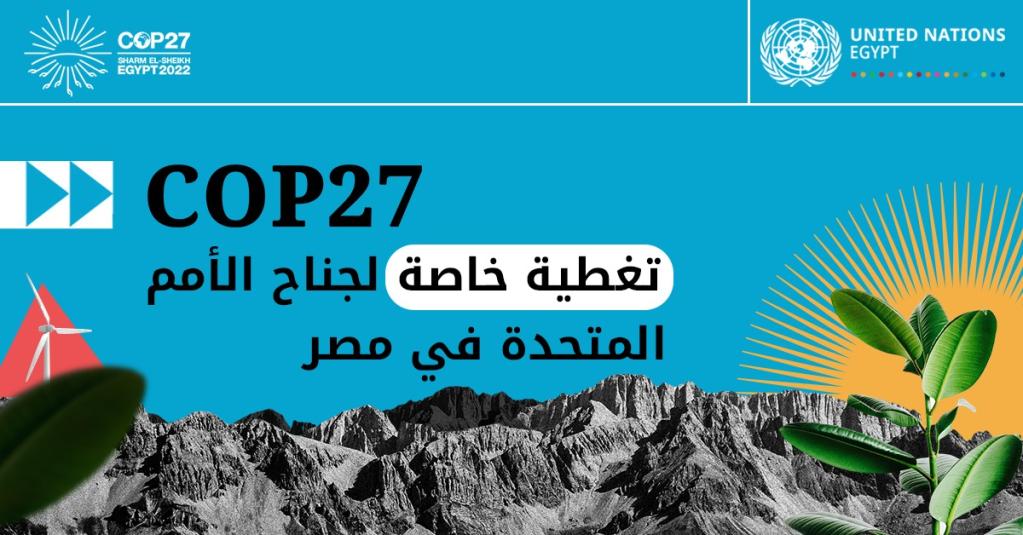
Story
26 April 2024
UN deputy chief encourages RC solidarity with African youth for SDG acceleration
Africa's youth and women were at the heart of discussions during UN Deputy Secretary-General Amina J. Mohammed’s annual meeting with Resident Coordinators from across the continent. The central focus was on accelerating progress on the Sustainable Development Goals (SDGs) and ensuring Africa’s voice is clearly heard in international negotiations at the upcoming Summit of the Future.
As the youngest continent on the planet, Africa faces unique challenges that slow down progress on the SDGs and fuel disillusionment with the effectiveness of current policies and their relevance to people. Ms. Mohammed emphasized the particular urgency to restore hope for young African men and women and make sustainable development a reality for them. “This is the continent that is the furthest behind, and so we have to pull it up,” she said.“We can turn that around, and we have six years [to do so], but we have to do that with youth. We have to do that with women.”This year’s strategic dialogue took place in the Ethiopian capital of Addis Ababa, on the margins of the tenth Africa Regional Forum on Sustainable Development between 23 and 25 April. The Regional Director for Africa of the UN Development Coordination Office Yacoub El-Hillo moderated the session.Deputy Secretary-General Mohammed emphasized the need for the UN to pool its expertise and support for African governments. She stressed that collaborative efforts should ensure political commitments to accelerate the SDGs translate into laws, policies and programmes that make societies resilient to crisis and able to anticipate and respond to their impact on the SDGs."We have to address the development emergency with the prevention tool, the recovery tool, the root cause tool and others [to know] what needs to happen to accelerate the SDGs," she stressed.Ms. Mohammed’s call to action was echoed by Under-Secretary-General Guy Ryder for Policy, who stressed the imperative of amplifying African voices in global decision-making processes leading up to the Summit of the Future in September.Mr. Ryder outlined progress on the Pact for the Future, the outcome document of the Summit with five pillars: financing for development; international peace and security; science, technology and innovation; youth and future generations; and transforming global governance.“This Summit and the content of the pact matter very much to Africa.” However, Mr. Ryder warned that African narratives and priorities are insufficiently represented in the negotiating process in New York, and called for the support of the Resident Coordinators to make sure that Africa’s voice is heard.The Summit of the Future will build on last year's SDG Summit, where UN Secretary-General António Guterres presented world leaders with six transformative pathways. These pathways aim to tackle critical areas such as food systems, energy access, digital connectivity, education, jobs, and climate change – all interconnected challenges demanding a systemic shift to achieve the SDGs.ImageCaption: Deputy Secretary-General Mohammed emphasized the need for the UN to pool its expertise and support for African governments.Photo: © UN\ Daniel GetachewRCs Charting the Course towards the Summit of the FutureResident Coordinators shared insights with Ms. Mohammed on successes and challenges in implementing SDG acceleration and discussing strategic pathways to support governments and partners.Among many different flagships shared by the RCs, the Resident Coordinator for Ethiopia Ramiz Alakbarov, provided examples of initiatives that integrate agro-food systems with climate adaptation, and support the livelihoods of women and young people in marginalized communities. The Resident Coordinator in Egypt Elena Panova noted her efforts in bringing international financial institutions and the private sector in discussions with the government on the transformative pathways and preparations for the Summit of the Future.The Resident Coordinator for Lesotho Amanda Mukwashi said the government’s national budget allocations are aligned with its political pledge with respect to digital transformation and energy access and can be used as a successful practice at the Summit of the Future.Cabo Verde has also fully aligned its national development plan with accelerating the SDGs, focusing on jobs and social protection, climate change and digital connectivity. Similarly, Ghana has designed a national dialogue with the government, civil society groups and others that will help helped integrate accountability for SDG summit commitment in proposals for the Summit of the Future.The Resident Coordinator for Botswana Zia Choudhury emphasized underrepresentation of young people in African policy conversations and the need to re-engage them as strategic partners. "What we want to do is to encourage young people to see development as a marathon, not as just a quick sprint a couple of times a year," he said. ImageCaption: Resident Coordinators shared insights with Ms. Mohammed on successes and challenges in implementing SDG accelerationPhoto: © UN\ Abel TakeleDiscussions recognized the crucial role of the Joint SDG Fund for leveraging partnerships and catalytic funding for SDGs, reforming of the SDG financial architecture remains key and in reframing the dialogue with international financial Institutions on SDG financing.The meeting was attended by a number of senior United Nations decision-makers, including Special Representative of the Secretary-General and Head of the UN Office to the African Union Parfait Onanga-Anyanga, Special Adviser on Africa Cristina Duarte, Special Coordinator for development in the Sahel Abdoulaye Mar Dieye, Assistant Secretary-General for Development Coordination Oscar Fernandez-Taranco and Assistant Secretary-General for Youth Felipe Paullier.In closing, the Deputy Secretary-General reiterated the UN development system’s determination to achieve the ambitious targets set forth in the SDGs. "We have six years left to move this agenda really fast. We don’t relax; we don’t give up," she said.
ImageCaption: Assistant Secretary-General for Development Coordination Oscar Fernandez-Taranco, Under-Secretary-General Guy Ryder for Policy and Regional Director for Africa of the UN Development Coordination Office Yacoub El-Hillo are pictured with DSG MohammedPhoto: © UN\ Daniel Getachew
As the youngest continent on the planet, Africa faces unique challenges that slow down progress on the SDGs and fuel disillusionment with the effectiveness of current policies and their relevance to people. Ms. Mohammed emphasized the particular urgency to restore hope for young African men and women and make sustainable development a reality for them. “This is the continent that is the furthest behind, and so we have to pull it up,” she said.“We can turn that around, and we have six years [to do so], but we have to do that with youth. We have to do that with women.”This year’s strategic dialogue took place in the Ethiopian capital of Addis Ababa, on the margins of the tenth Africa Regional Forum on Sustainable Development between 23 and 25 April. The Regional Director for Africa of the UN Development Coordination Office Yacoub El-Hillo moderated the session.Deputy Secretary-General Mohammed emphasized the need for the UN to pool its expertise and support for African governments. She stressed that collaborative efforts should ensure political commitments to accelerate the SDGs translate into laws, policies and programmes that make societies resilient to crisis and able to anticipate and respond to their impact on the SDGs."We have to address the development emergency with the prevention tool, the recovery tool, the root cause tool and others [to know] what needs to happen to accelerate the SDGs," she stressed.Ms. Mohammed’s call to action was echoed by Under-Secretary-General Guy Ryder for Policy, who stressed the imperative of amplifying African voices in global decision-making processes leading up to the Summit of the Future in September.Mr. Ryder outlined progress on the Pact for the Future, the outcome document of the Summit with five pillars: financing for development; international peace and security; science, technology and innovation; youth and future generations; and transforming global governance.“This Summit and the content of the pact matter very much to Africa.” However, Mr. Ryder warned that African narratives and priorities are insufficiently represented in the negotiating process in New York, and called for the support of the Resident Coordinators to make sure that Africa’s voice is heard.The Summit of the Future will build on last year's SDG Summit, where UN Secretary-General António Guterres presented world leaders with six transformative pathways. These pathways aim to tackle critical areas such as food systems, energy access, digital connectivity, education, jobs, and climate change – all interconnected challenges demanding a systemic shift to achieve the SDGs.ImageCaption: Deputy Secretary-General Mohammed emphasized the need for the UN to pool its expertise and support for African governments.Photo: © UN\ Daniel GetachewRCs Charting the Course towards the Summit of the FutureResident Coordinators shared insights with Ms. Mohammed on successes and challenges in implementing SDG acceleration and discussing strategic pathways to support governments and partners.Among many different flagships shared by the RCs, the Resident Coordinator for Ethiopia Ramiz Alakbarov, provided examples of initiatives that integrate agro-food systems with climate adaptation, and support the livelihoods of women and young people in marginalized communities. The Resident Coordinator in Egypt Elena Panova noted her efforts in bringing international financial institutions and the private sector in discussions with the government on the transformative pathways and preparations for the Summit of the Future.The Resident Coordinator for Lesotho Amanda Mukwashi said the government’s national budget allocations are aligned with its political pledge with respect to digital transformation and energy access and can be used as a successful practice at the Summit of the Future.Cabo Verde has also fully aligned its national development plan with accelerating the SDGs, focusing on jobs and social protection, climate change and digital connectivity. Similarly, Ghana has designed a national dialogue with the government, civil society groups and others that will help helped integrate accountability for SDG summit commitment in proposals for the Summit of the Future.The Resident Coordinator for Botswana Zia Choudhury emphasized underrepresentation of young people in African policy conversations and the need to re-engage them as strategic partners. "What we want to do is to encourage young people to see development as a marathon, not as just a quick sprint a couple of times a year," he said. ImageCaption: Resident Coordinators shared insights with Ms. Mohammed on successes and challenges in implementing SDG accelerationPhoto: © UN\ Abel TakeleDiscussions recognized the crucial role of the Joint SDG Fund for leveraging partnerships and catalytic funding for SDGs, reforming of the SDG financial architecture remains key and in reframing the dialogue with international financial Institutions on SDG financing.The meeting was attended by a number of senior United Nations decision-makers, including Special Representative of the Secretary-General and Head of the UN Office to the African Union Parfait Onanga-Anyanga, Special Adviser on Africa Cristina Duarte, Special Coordinator for development in the Sahel Abdoulaye Mar Dieye, Assistant Secretary-General for Development Coordination Oscar Fernandez-Taranco and Assistant Secretary-General for Youth Felipe Paullier.In closing, the Deputy Secretary-General reiterated the UN development system’s determination to achieve the ambitious targets set forth in the SDGs. "We have six years left to move this agenda really fast. We don’t relax; we don’t give up," she said.
ImageCaption: Assistant Secretary-General for Development Coordination Oscar Fernandez-Taranco, Under-Secretary-General Guy Ryder for Policy and Regional Director for Africa of the UN Development Coordination Office Yacoub El-Hillo are pictured with DSG MohammedPhoto: © UN\ Daniel Getachew
1 of 5
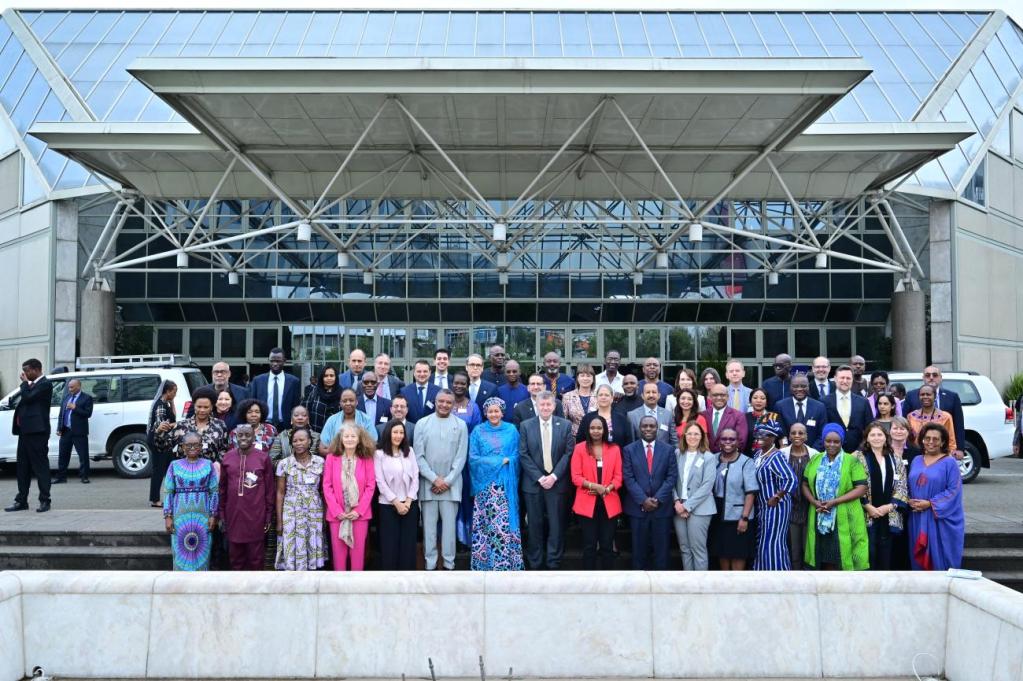
Story
21 April 2024
Bridging the Digital Divide in Egypt
Providing every child and adolescent equal access to the internet in a safe and responsible way can be a powerful tool for development. Building on the efforts led by the Government of Egypt to promote digital literacy, UNICEF is joining hands with partners such as Magnom Properties to create access to safe digital learning opportunities for all children and adolescents.Access to internet connectivity has increasingly become an integral part of human development and a right for everyone at any time.As we mark the International Day of the Girl Child 2023, the Government of Egypt and development partners are reaffirming commitments and investing in the actions needed to prioritize gender equality within the Sustainable Development Strategy 2030.When girls realize their rights and achieve their full potential, many of them champion solutions and bring about change in their communities.Technology can be a powerful tool for children and adolescents, particularly girls’ – for learning, making their digital environment safer, and empowering them to create digital content.UNICEF/Egypt 2023/Basma FathyTo’aa an 18-year-old girl from Upper Egypt said, “I really benefited from the digital literacy training.” In the training I learned not only how to search for internships; but also, how to protect myself online,” said To’aa.UNICEF/Egypt 2023/Basma FathyRo’aa Hussein and Nour Mohamed, 16 years old, are two best friends who received the digital literacy training provided by UNICEF in close cooperation with national partners. Studying and communicating with their friends is what Ro’aa and Nour mostly do online, “we study together through video calls, and we also take pictures and share entertaining moments on our social media platforms,” said Ro’aa. The internet offers many opportunities that were unimaginable a generation ago. It has the power to transform young people’s lives, enabling them to learn new things, develop new skills, earn money, safely navigate online, and have their voices be heard.UNICEF/Egypt 2023/Basma FathyMagnom Properties is supporting UNICEF in implementing Egypt’s vision to provide internet access to less connected communities across the country and facilitate their acquiring of essential skills and opportunities within the digital realm.Thanks to Magnom Properties’ contribution, UNICEF is facilitating access to information and digital training to young people, especially girls, to equip them with the necessary skills for better career opportunities and prospects of their choice.
1 of 5
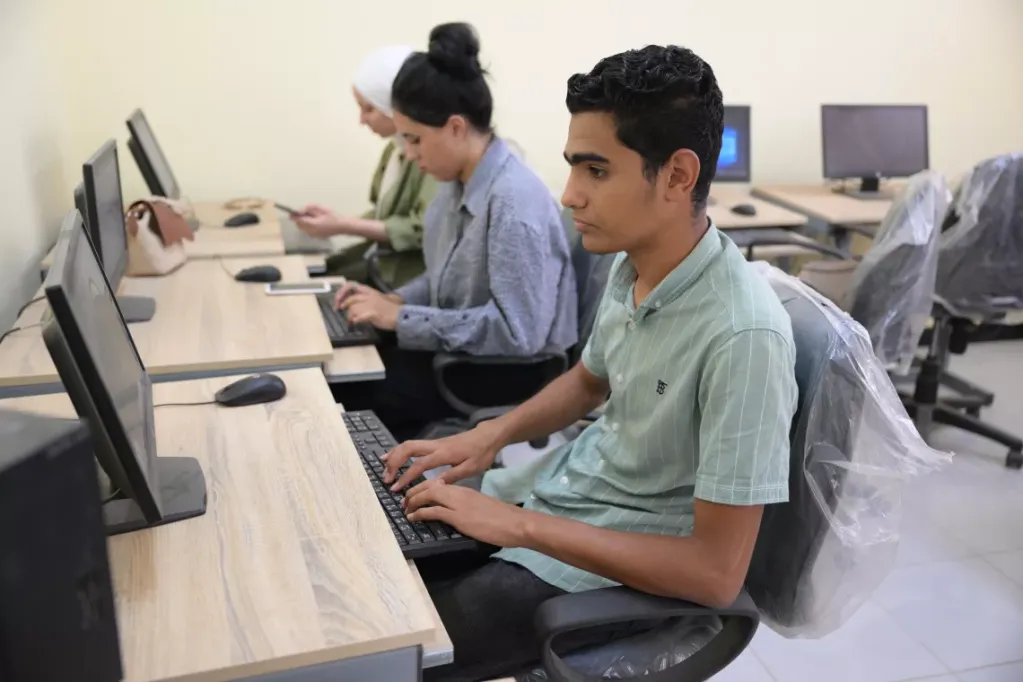
Story
11 March 2024
Inspiring Inclusion for Collective Success: UN Joint Programme Empowers Women in Egypt through skills training
Inspiring Inclusion for Collective Success: UN Joint Programme Empowers Women in Egypt through skills training Inspired by the vibrant colours and intricate embroidery of Egyptian Khayamiya, Hanaa Redwan saw an opportunity to turn her passion into a business. Supported by ‘Rabeha’, a joint programme implemented by UNIDO and UN Women, Hanaa’s journey exemplifies determination, resilience and the transformative power of skills development. Hanaa Redwan, founder of Al Yasser Handicrafts, embarked on her entrepreneurial journey driven by the necessity to work while balancing familial responsibilities. "When I needed to find a job, but couldn’t work outside the home, I thought about making handmade products," shares Hanaa. "While researching ideas I discovered the ancient craft of Khayamiya. I loved the beautiful colours and embroidery work and was determined to learn the craft." Despite initial skepticism from relatives and neighbours, Hanaa persevered, taking courses to improve her Khayamiya skills and enhance product quality. Initially, she relied on intermediaries and traders for marketing, who often offered unfair prices. However, she overcame this challenge by showcasing her work at exhibitions, enabling direct interaction with customers. With support from the Micro, Small and Medium Enterprises Development Agency (MSMEDA) she also participated in national exhibitions, providing valuable insights into customer preferences and increasing demand for her products. To meet growing orders and expand her business, Hanaa initiated Khayamiya training sessions for women in her village of Beni Suef. Faced with the absence of a workshop for collaborative work, she invested her earnings to establish a dedicated workspace. This initiative not only facilitated collaborative efforts among women but also fostered their economic empowerment. “At first, the societal culture made it difficult for the women to work outside their households,” explains Hanaa. “However, through training, employment opportunities and the income generated by these women, our community gradually embraced the idea and supported our collaborative efforts.” Hanaa's entrepreneurial journey intersected with Rabeha, a joint programme implemented by UNIDO and UN Women and funded by Global Affairs Canada, aimed at promoting women’s economic empowerment for inclusive and sustainable growth in Egypt. Through Rabeha, Hanaa received training in green and circular economy principles, enabling her to tackle rising raw material costs. "Rabeha’s circular economy training equipped me with strategies to reduce waste, recycle materials and maintain high-quality standards. Faced with increasing raw material costs, this training enabled me to save 70% on production costs by effectively utilising and recycling all materials from my work." Through Rabeha, Hanaa also honed her business acumen as well as her design skills, learning to create products from diverse materials like Khayamiya combined with crochet or leather. Design and product development training provided by Rabeha, facilitated collaboration among a network of women artisans, enhancing their collective skills and creativity. Together, they produce joint products that blend traditional Egyptian crafts with contemporary elements. "In the past, my primary focus was on ensuring product quality. However, through participating in Rabeha training, I’ve broadened my perspective to think more strategically about entrepreneurship, becoming a successful businesswoman and exploring market opportunities." In the future, Hanaa aspires to elevate Al Yasser Handicrafts onto the global stage. Her ambitions include exporting her creations, participating in international exhibitions, and training women from diverse backgrounds. As International Women's Day approaches[EC1] [KN2] , Hanaa reflects on her journey and advocates for inclusivity and collaboration. “I'm really proud of what I have achieved through my Khayamiya business," emphasises Hanaa. "I think it's crucial that organisations and communities support women to achieve their goals. Together, we can overcome challenges and achieve collective success." Rabeha (meaning “winner” in Arabic) aims to support the economic empowerment of more than 6,300 women in 7 governorates through increased access to employment and self-employment opportunities. The programme is implemented by UNIDO and UN Women in partnership with the National Council for Women (NCW), the Ministry of Trade and Industry (MoTI) and the Medium, Small and Micro Enterprises Development Agency (MSMEDA), with the generous support of Global Affairs Canada (GAC).
1 of 5
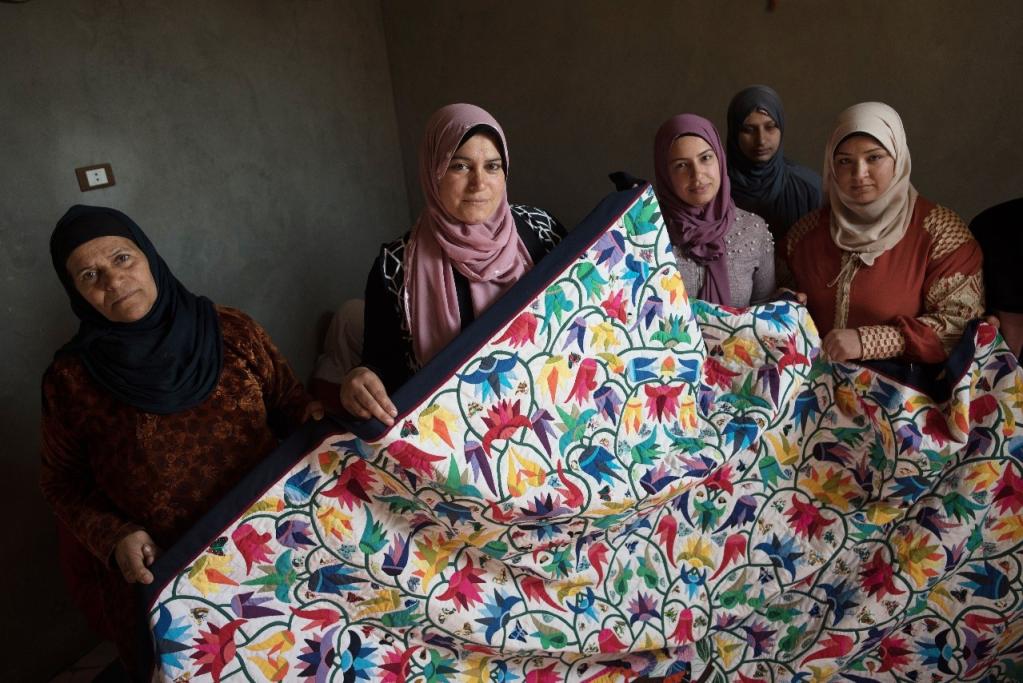
Story
05 March 2024
Egypt.. new podcast to inspire action for sustainable development
The United Nations Information Centre in Cairo announced the launch of its new podcast, "Voices of Impact: UN in Egypt", with the UN in Egypt Resident Coordinator, Elena Panoa, being its first guest. This flagship podcast is set to shed light on the significant work carried out by the United Nations in Egypt, marking an important milestone in the enduring and successful partnership between the United Nations and Egypt, as a founding member of the international organization. “Voices of Impact: UN in Egypt" serves as an inspiring platform to explore and highlight the impactful initiatives, programs, and collaborations led by the United Nations within the Egyptian context. Through engaging discussions, interviews, and narratives, the podcast aims to showcase the multifaceted efforts undertaken to address pressing global challenges while fostering development, sustainability, and peace in Egypt and beyond.A wide array of perspectives will be presented, including UN officials, governmental and non-governmental organization representatives, experts, influencers, beneficiaries, and community leaders. The podcast will provide a comprehensive and insightful overview of the United Nations' invaluable contributions to Egypt's development journey and its commitment to leaving no one behind.In the first episode, Ms. Panova sheds light on the role played by the UN to resolve and alleviate the severe impacts of world and regional crises. She also highlights the work of the UN family in Egypt to support the government's efforts to achieve national priorities and the sustainable development goals. Moreover, she provides young people with valuable advice for personal and career development, including the possibility for them to join the United Nations or contribute to its work in Egypt and around the world. As the world faces increasingly complex challenges, the podcast will underscore the significance of multilateralism and international cooperation in tackling global issues effectively, by highlighting success stories, innovations, and collaborative partnerships. "Voices of Impact: UN in Egypt" aims to inspire individuals, communities, and stakeholders to actively contribute to positive change and sustainable development efforts.
1 of 5
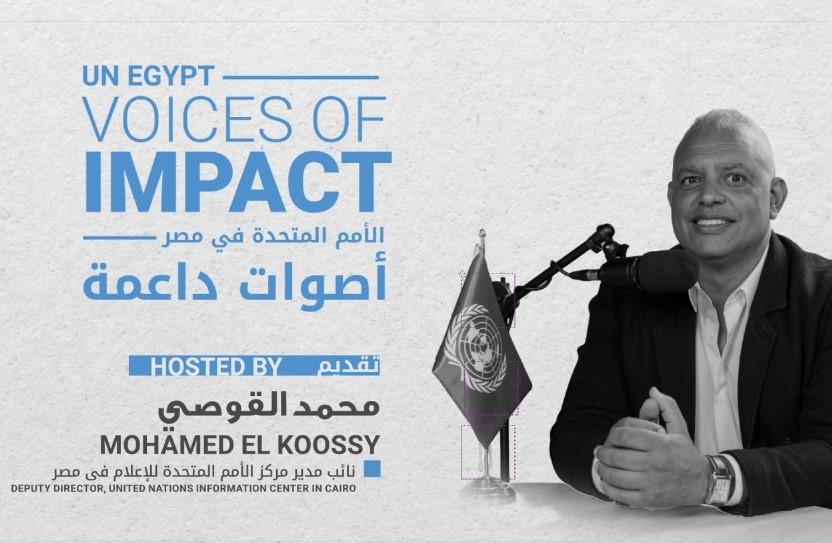
Story
03 December 2023
Gaza: UN Egypt fully mobilized as Egypt stands at forefront of humanitarian effort
In a robust response to the severe humanitarian crisis unfolding in Gaza, Egypt has designated North Sinai's El-Arish International Airport as the hub for humanitarian supplies arriving from around the world. The Egyptian Red Crescent Society coordinates the humanitarian aid in El-Arish and manages its delivery into Gaza via the Rafah border crossing.
The United Nations (UN) system in Egypt has joined forces with the Egyptian government to deliver crucial aid to those in desperate need in Gaza. The collaborative effort, focused on utilizing Rafah as a lifeline for 2.2 million Palestinians, marks a significant step towards addressing the dire situation.
Preparations by the UN in Egypt were underway even before aid was allowed into Gaza on October 21, for the first time since the outbreak of hostilities. In a collective UN system response, overseen by UN Resident Coordinator Elena Panova, the UN country team is working hand in hand with the Egyptian Red Crescent Society and other Egyptian institutions to accelerate the delivery of assistance to the people of Gaza.
US$1.2 billion needed to support people in the Occupied Palestinian Territories
Earlier in November, the United Nations and its partners issued Flash Appeal for scaling up humanitarian operations in support of 2.2 million people in the Gaza Strip and 500,000 of the most vulnerable inhabitants of the West Bank.
According to the Flash Appeal, at least US$1.2 billion is required to deliver existing humanitarian services amid ongoing hostilities. According to OCHA, only 20.9 per cent of that amount has been mobilized, while more than 80 per cent of the population is in dire need of humanitarian assistance.
The UN would like to express its gratitude to donors who provided generous support to the Flash Appeal for the Occupied Palestinian Territory 2023 and to those who gave in-kind assistance to Gaza through the Egyptian Red Crescent Society.
Egypt at the forefront of humanitarian and diplomatic efforts
Since the outbreak of the Gaza crisis, the government of Egypt has been at the forefront of lifesaving efforts, with the Rafah crossing and El-Arish airport serving as centers of hope to alleviate the suffering.
“As the UN in Egypt, we have been working with relevant authorities in Egypt and the Egyptian Red Crescent Society to facilitate an efficient and needs-based logistics system to allow for humanitarian assistance to reach Gaza,” UN Resident Coordinator Elena Panova said.
“Let me highlight that what we do on the Egyptian side of the border, in assisting to put in place a humanitarian lifeline to Gaza, we do so thanks to the efforts of the Government of Egypt, and under the leadership of the Egyptian Red Crescent Society,” she added.
Ms. Panova noted that the Egyptian authorities have enabled a technical team of UN experts to temporarily support the Egyptian Red Crescent Society in El-Arish in an advisory and consultative capacity. “From our side, working with colleagues in the Occupied Palestinian Territory, we aim to ensure that what gets in speaks to what is most needed in Gaza at that point in time,” she said.
Below is an overview of key responses by the UN in Egypt, with a special focus on assistance that has been moved across the border since October 21.
Multi-layer support to Egyptian Health System and Services
The World Health Organization (WHO) provided essential supplies from its Dubai logistics hub, via 14 trucks through Rafah crossing to Gaza. These included trauma supplies for 3,500 injured individuals, medication for 151,500 people with Non-communicable Diseases (NCDs), 235 portable trauma bags, essential health supplies for 400,000 people, and enough trauma essentials to support 800 surgeries.
Moreover, WHO Egypt has supported the Egyptian Council for Tribes and Families in procurement of essential needs for children, women, and elderly people, including wheelchairs, personal sanitary and hygiene items, for almost US$23,000.
WHO Egypt contributed to supporting blood donation campaigns by providing 1,600 cooling packs and 200 foam cooling boxes worth almost US$16,000 to the National Blood Transfusion Service/MOHP to have the capacity to transfer the blood products to Gaza.
WHO has also provided the North Sinai Health Directorate with environmental equipment and supplies, and Water, Sanitation and Hygiene (WASH) essentials, including 10,000 liters of detergents and disinfectants, as well as 10,000 hygiene kits. These supplies are intended to support the National Humanitarian Response and provide medical care for injured people who have crossed through Rafah from Gaza, with a total cost of almost US$113,000.
In addition, WHO Egypt has supported the curative sector and the Ministry of Health with anesthesia drugs, worth almost US$11,000, for 1,000 patients among the medical evacuees.
To strengthen the referral hospitals, within the medical evacuation pathway of injured people from Gaza, WHO Egypt supported the Ministry of Health by providing trauma kits and orthopedics essentials. These items are meant for 1,000 patients, with a budget of US$580,000.
Also, responding to a Ministry of Health request, WHO Egypt procured a CT scan and 2 C-Arms to support the referral hospitals within the medical evacuation pathway of injured people from Gaza, with an estimated budget of US$400,000. These items are critical to save the lives of seriously injured people with fractures and cardiac respiratory problems.
And to support the Egyptian Red Crescent Society’s logistics and operations during the Gaza crisis, WHO Egypt procured two vehicles with cold chain capabilities with total cost of US$78,000. This aims to ensure the effective transportation and storage of critical supplies, maintaining the integrity of the cold chain throughout the distribution process.
Capacity building of Healthcare Providers
As part of the response to the medical evacuation of injured people from Gaza, WHO Egypt is conducting a series of training courses covering different topics to enhance the knowledge and skills of the Healthcare Providers (HCPs), including:
Mental health and psycho-social support (MHPSS) training covering psychological first aid and trauma focused psychotherapy, for 15 psychologists and 20 psychiatrists.
A Basic Emergency Course for 125 health care providers, mainly nurses and physicians from different entities. The course includes managing injured and acutely ill individuals from the medical evacuees in Egypt and has a large practical component which also includes conflict-related injuries including burns and blast injuries.
Emergency response with high volumes of supplies
Since the start of the crisis, UNICEF has acted swiftly to procure lifesaving supplies to the State of Palestine through Egypt, being among the top three organizations in terms of movement of humanitarian supplies into Gaza from Egypt. So far, UNICEF is heavily engaged in the emergency response with high volumes of supplies procured offshore, regionally, and locally to support lifesaving WASH and Health care services as well as child protection, nutrition, and when possible, a return to education and learning.
As of 21 November, 88 UNICEF trucks with emergency supplies have entered Gaza through the Rafah crossing since 21 October.
These trucks have included bottled water to cover an estimated 870,000 people, and WASH Dignity Kits to serve nearly 50,000 people. UNICEF has also provided health supplies, which arrived in the Gaza Strip and were distributed among three hospitals in Khan Younis and Deir Al Balah. These supplies included health consumables that will serve 137,000 cases, medicines for 45,000 cases, various types of medical kits, midwifery and Inter-Agency Emergency Health Kits (IEHK) to support 250,000 cases and micro-nutrients for 280,000 people.
In addition, UNICEF has supplied recreational and Early Childhood Development kits for 36,000 children and ‘School in a Box’ for 24,000 students. Also, 4,000 blankets were distributed to hospitals and non-UNRWA shelters, and children’s diapers to cover around 6,700 children were distributed to both UNRWA and non-UNRWA shelters.
The supply convoys from Egypt which entered Gaza through the Rafah crossing are a lifeline for the millions of people in Gaza and offer them a glimmer of hope. But this is a drop in the bucket, stresses UNICEF Egypt, noting the huge numbers of people who need assistance.
Support to Egypt’s efforts to facilitate urgent medical evacuations
On the meantime, UNICEF is supporting the Government of Egypt to facilitate the evacuation of urgent medical cases from Gaza, allowing them to access critical health services in Egypt safely. More specifically, UNICEF and its partners support the Ministry of Health with medical equipment and supplies. These include 215 oxygenators, 140 syringes and infusion pumps, and 7,500 boxes of surgical sutures. The priority is medical supplies to support the initial humanitarian response for about 12,000 medical cases. Additionally, UNICEF is providing 58 tents of various sizes for use as field hospitals, 10 wheelchairs, and 9 mobile health clinics to support health facilities. Furthermore, 40 healthcare workers have received training on nutrition screening to enhance their capacity to provide comprehensive care to those in need. UNICEF also delivered 20,000 drinking water bottles (600ml each) to address the essential need for clean and safe drinking water in the affected areas.
Support for child protection services
Furthermore, UNICEF is supporting the Ministry of Social Solidarity by providing child protection services based on identification and assistance to vulnerable children, including unaccompanied and separated children. UNICEF is doing this by setting up two child-friendly spaces in the hospitals to provide children with a basic package of mental health and psychosocial support, including psychosocial first aid, referral of children in need to specialized child protection services, and distribution of the prepositioned 2,000 hygiene kits – in coordination with the Egyptian Red Crescent Society – and winterization items.
More food supplies, solutions to support humanitarian community amid repeated communications blackouts
The World Food Programme (WFP) has brought in 73 trucks carrying 1,296 metric tons of food supplies that arrived in Gaza through the Rafah crossing border, including canned fish, date bars, and food parcels that have reached over 500,000 people in Gaza.
WFP is deploying staff to El-Arish in support of the Egyptian Red Crescent Society, to deliver much-needed aid into Gaza through Rafah and expanding support to the Palestinian Red Crescent Society.
In addition, WFP has around 674 metric tons (food parcels, date bars, fava beans. biscuits) of food currently available in Egypt, and over 16,000 metric tons of food commodities are being procured from the region to support the Gaza response.
The WFP-led Emergency Telecommunications Cluster is ready to set up communications systems in Gaza so that the humanitarian community can effectively operate despite the repeated communications blackouts. It has sourced telecommunications equipment, focusing on alternative energy solutions that run independently of local operators.
Delivery of assistance desperately needed as winter looms
IOM has successfully delivered the following humanitarian aid to the Egyptian Red Crescent Society which was then moved to Gaza through Rafah:
- 400 bedsheets and covers
- 200 mattresses
- 500 dignity kits
- More than 1,000 hygiene kits
- More than 4,000 medical consumables
- More than 1,900 medicines
- 3000 tarpaulins
IOM Egypt also stands ready to deliver more aid consisting of 30,000 boxes of water, 600 hygiene kits, more than 20,000 shelter Items and more than 4,000 water purifiers as well as 500 family tents.
UNHCR, the UN Refugee Agency, donated 150.5 metric tons of winter clothes and drinking water to meet some of the humanitarian needs in Gaza through the Egyptian Red Crescent Society. The assistance has already reached Gaza through the Rafah crossing.
UNHCR is working closely with the Egyptian Red Crescent Society and the UN in Egypt to deliver more aid soon.
UPDATE
The United Nations Development Programme (UNDP) in Egypt on 21 December, 2023, announced a comprehensive contribution to the Egyptian Red Crescent (ERC) to strengthen their capabilities in responding to the ongoing Gaza War, which includes a financial contribution of approximately EGP 5 million to address ERC’s pressing needs arising from the war.
UNDP Egypt’s support to ERC is strategically directed towards several key areas, aiming to enhance ERC's operational efficiency and overall effectiveness in delivering humanitarian aid. This includes strengthening ERC’s staffing capacities, establishing critical humanitarian service points that act as central hubs for the distribution of essential resources, support, and aid to affected populations and building the capacities of ERC volunteers in emergency response. ERC plays a critical role in supporting access to Gaza through the only crossing point for the passage of aid and commercial supplies from the Egyptian borders.
1 of 5
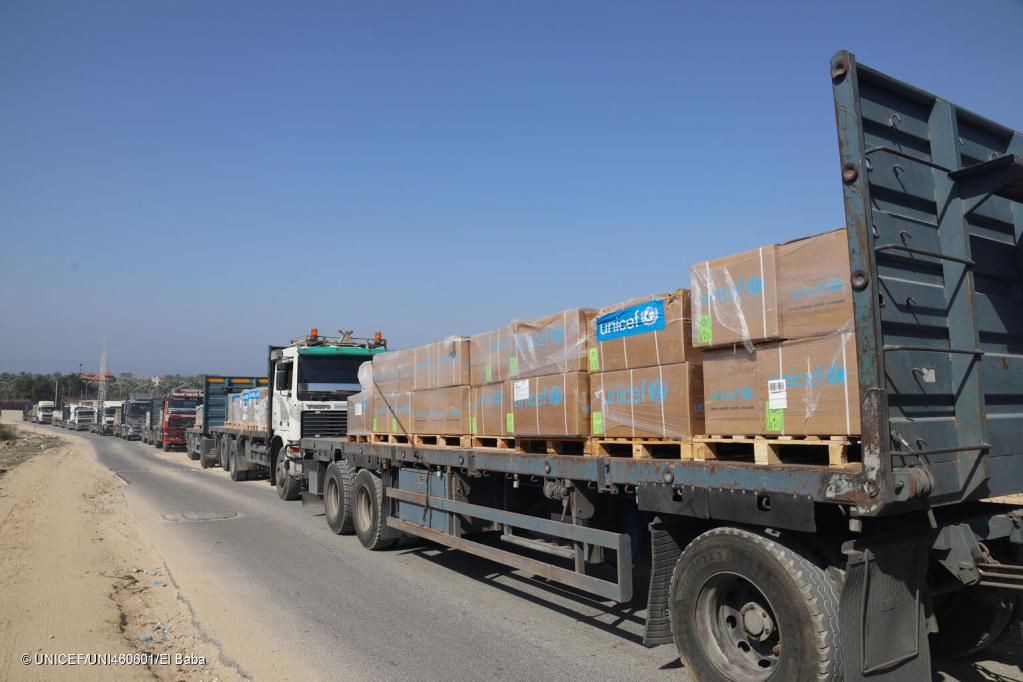
Press Release
24 April 2024
THE SECRETARY-GENERAL -- MESSAGE ON THE INTERNATIONAL DAY OF MULTILATERALISM AND DIPLOMACY FOR PEACE 24 April 2024
These eternal ideals form the foundation of the United Nations Charter, and drive global efforts to safeguard human rights and forge hope, prosperity and peace for all people. But around the world, conflicts, climate catastrophe, poverty and inequalities create enormous obstacles to diplomacy and multilateral solutions. Collaboration is consumed by competition; dialogue is overtaken by relentless division. Diplomacy and the multilateral system itself were created precisely for moments like this. We need to resurrect a new spirit of global cooperation to rebuild trust, heal divisions, and place humanity on the path to peace. The Summit of the Future this September will be a critical opportunity for countries to share solutions. A New Agenda for Peace that takes a holistic approach to the drivers of conflict can help to restore faith in the multilateral system and what we can accomplish by working as one. On this important day, I call on all governments and leaders to spare no effort to bridge divides, renew dialogue and trust, and deliver a peaceful future.
1 of 5
Press Release
23 April 2024
WFP AND EU FORGE NEW PARTNERSHIP TO EMPOWER REFUGEES AND HOST COMMUNITIES IN EGYPT
The European Union’s (EU) €2 million contribution will target 6,000 people from nine different countries living in Egypt – including Sudanese refugees who escaped conflict – through targeted capacity-building initiatives in Cairo, Alexandria, Aswan, Damietta, and other regions across the country. Throughout the 18-month program, participants will receive training across a diverse array of fields, including skilled trades like carpentry, manufacturing, and craftsmanship. By engaging the private sector, the programme also facilitates on-the-job trainings to ensure a seamless transition from learning to employment opportunities. WFP Egypt's Interim Country Director, Gianpietro Bordignon, H.E Ambassador Christian Berger, Head of the EU Delegation to Egypt, and a delegation from the EU visited Aswan to mark the programme's launch that kicked off with a series of vocational trainings with refugees, including digital marketing, graphic design, and culinary sessions. Minister of International Cooperation H.E. Dr. Rania A. Al-Mashat and Minister of Social Solidarity Dr Nevine Al-Kabbaj also attended the inauguration in Aswan. “The World Food Programme (WFP) and the European Union (EU) are key development partners to Egypt, working collaboratively within our diverse cooperation portfolio that includes food security and investing in human capital. This is a core part of putting forth a people-centric, inclusive development,” said H.E. Dr. Rania A. Al-Mashat, Minister of International Cooperation. “While Egypt hosts over 9 million migrants and refugees from diverse nationalities, the Ministry of Social Solidarity (MOSS) supports the provision of a multifaceted intervention social service package that encompasses humanitarian assistance, social care, social protection, and economic empowerment measures targeting refugees and host communities, with a special emphasis on the most vulnerable groups including women, children, persons with disabilities, persons without care, and elderly. MOSS acknowledges the importance of support provided through partners from line ministries, civil society, and international partner organizations, and we strongly commend the strong and effective partnership with the European Union Delegation in Egypt that enables us to introduce comprehensive and sustainable solutions to rising crises and emergencies”, said Minister of Social Solidarity H.E. Dr. Nevine Al-Kabbaj. "Migration, resilience, livelihood, and social cohesion are priorities for the EU as they aim at peaceful coexistence. We are convinced that inclusion and self-reliance represent concrete solutions to address the needs of refugees and local communities. We believe in initiatives involving youth and women as gateways for reconciliation, social cohesion, and education for peace across society," said H.E Ambassador Christian Berger. "The EU is a long-standing partner of WFP in Egypt, and we are thrilled to expand the scope of our partnership to build the resilience of refugees and their host communities in Egypt and help increase their employment opportunities,” said Gianpietro Bordignon, WFP Interim Country Director in Egypt.” Thanks to the EU’s contribution, WFP in Egypt can provide them with the essential tools that would allow them to become self-reliant and secure their basic needs independently. Our gratitude extends to our Egyptian partners, whose collaboration makes this vital work possible. Together, we are dedicated to improving the lives of those facing the greatest challenges." Under WFP’s current five-year programme (2023-2028), WFP Egypt is dedicated to supporting local communities, people affected by crisis and refugees from more than nine countries, offering them cash assistance, nutrition support, and vocational training programmes to enhance their food security. # # # About WFP The United Nations World Food Programme is the world’s largest humanitarian organization saving lives in emergencies and using food assistance to build a pathway to peace, stability and prosperity for people recovering from conflict, disasters and the impact of climate change. Follow us on Twitter @WFP_Arabic and @WFP_MENA And on Instagram @WFP_Egypt
1 of 5
Press Release
22 April 2024
Statement attributable to the Spokesperson for the Secretary-General – on the UN Relief and Works Agency for Palestine Refugees in the Near East (UNRWA)
The Secretary-General is also grateful to the Raoul Wallenberg Institute, the Chr. Michelsen Institute, and the Danish Institute for Human Rights, for the essential research that they conducted. The Secretary-General accepts the recommendations contained in Ms. Colonna's report. He has agreed with Commissioner General Philippe Lazzarini that UNRWA, with the Secretary-General’s support, will establish an action plan to implement the recommendations contained in the Final Report.In this regard, the Secretary-General counts on the cooperation of the donor community, the host countries and the staff to fully cooperate in the implementation of the recommendations. Moving forward, the Secretary-General appeals to all stakeholders to actively support UNRWA, as it is a lifeline for Palestine refugees in the region. Stéphane Dujarric, Spokesman for the Secretary-General New York, 22 April 2024
1 of 5
Press Release
22 April 2024
HE SECRETARY-GENERAL-- MESSAGE FOR THE INTERNATIONAL MOTHER EARTH DAY 22 April 2024
We depend on nature for the food we eat, the air we breathe, and the water we drink. Yet, we have brought chaos to the natural world: poisoning our planet with pollution, wiping out species and ecosystems with abandon, and destabilising our climate with greenhouse gas emissions. These actions harm nature, and they harm humanity. We are imperilling food production, polluting our ocean and air, creating a more dangerous, less stable environment, and holding back sustainable development. Together, we must restore harmony with nature, embrace sustainable production and consumption, and protect ourselves from harm – creating jobs, reducing poverty and driving sustainable development as we do so. That means slamming the brakes on biodiversity loss, putting a stop to pollution, and slashing greenhouse gas emissions globally. It means supporting Indigenous Peoples, local communities, and others being hit hardest by the pollution, climate and biodiversity crises. It means delivering climate justice to countries on the frontline of climate chaos, and swiftly mobilising the finance and support countries need to act on climate, protect nature and promote sustainable development. Countries must produce new national climate plans that align with limiting the rise in global temperature to 1.5 degrees Celsius. These can double as national transition plans and national investment plans, underpinning sustainable development for generations to come. And the G20 must lead a fast, fair and funded global phaseout of fossil fuels, and put a stop to nature-wrecking subsidies, such as those that underwrite runaway production of planet-choking plastics. Repairing relations with Mother Earth is the mother of all of humanity’s challenges. We must act – and act now – to create a better future for us all. ***
1 of 5
Press Release
17 April 2024
UNODC launches the Youth Network for the Middle East and North African (MENA) region to support youth efforts against drugs, violence and crime
The launch was attended by H.E. Dr. Nivine El Kabbag, the Egyptian Minister of Social Solidarity, Dr. Amr Osman, Director of the Egyptian Fund Drug Control and Treatment of Addiction, Mr. Mostafa Ezz Elarab, Assistant Minister of Youth and Sports for Youth Policies, Ms. Cristina Albertin, the UNODC Regional Representative for the Middle East and North Africa, Mr. Holger Illi, the Representative of the German Federal Ministry of Development and Economic Cooperation (BMZ), UNFPA representatives, youth, anti-corruption and drug prevention experts, representatives from the League of Arab States (LAS) and other relevant stakeholders. Addressing the youth, Dr. Nivine El Kabbag, the Minister of Social Solidarity, noted “You are carrying a noble mission to spread peace, and combat drugs and their associated societal violence. I am confident that your rich participation will have a significant impact in spreading this message among your peers.'" The UNODC MENA Youth Network aims to empower young people to become active agents of change in their communities against drugs, violence and crime through three pillars: empowerment, meaningful participation and youth-focused partnerships and networking. The youth passionately declared during their speech, "Launching the network stems from the belief in our right to participate in shaping the presence and the future, and it reinforces the active role of youth on both the national and regional levels, especially amidst the circumstances and challenges facing our region." 34 youths, distinguished by their exceptional community engagement and leadership skills, were chosen to represent their countries. Half were nominated by relevant ministries and other national implementing partners, while the remaining half were selected competitively from a total of 683 candidates. From her side, Ms. Cristina Albertin stressed in her remarks that “through this Network, we [UNODC] have advanced beyond mere discussions on the meaningful participation of youth to actualize their involvement in action. We acknowledge the youth's role as equal partners in building the societal fabric, empowering them to act as agents of change and implement UNODC's prevention programmes within their communities, as a part of our vision for enduring change and sustainability.” Mr. Mostafa Ezz Elarab, Assistant Minister of Youth and Sports for Youth Policies, affirmed that “We pin our hopes on this network being a genuine platform for youth, enabling them to achieve their aspirations and contribute to building a better future for their countries and homelands.” "The excellent partnership with UNODC and Germany in the MENA region (….) supports young people to empower their peers significant contribution for institution allowing more effective response to the needs of vulnerable and at risk youth and children, crime prevention, violence, rehabilitation and reintegration, and even with the difficulties of this year of 2023 achieved very impressive outcomes" added Mr. Holger Illi, the Representative of BMZ. The youth representatives will gather for a 4-day training event. The launch concluded the first two days of the agenda with the focus on empowering youth for community engagement and leadership through the introduction of UNODC's mandate and the Youth4Impact regional programme objectives, strategy development, critical analysis of challenges, decision-making, partnerships, and advocacy for social change. As a result of this training, the youth representatives drafted their relevant envisioned actions to implement in their respective countries’ communities. Over the next two days, the agenda focuses on enhancing the young participants’ awareness about corruption, governance, and anti-corruption strategies, culminating in the development of a "MENA Youth 2030 Anti-Corruption Vision" and engaging in creative and strategic sessions to empower youth-led anti-corruption actions in the MENA region, as a part of the Global Resource for Anti-Corruption Education and Youth Empowerment (GRACE) initiative. GRACE aims to leverage education and youth empowerment to foster transparency, accountability, integrity, and a culture that rejects corruption. GRACE operates through primary and secondary education, academia and research, and youth empowerment, each targeting different levels of education and aspects of society to instill an anti-corruption mindset. The UNODC MENA Youth Network is part of the “Youth 4 Impact” regional programme, which aims to empower young men and women, including those who are marginalized and at risk, to face life's challenges and become more resilient against crime, violence, and drugs. Since its inception in 2022, "Youth 4 Impact" has positively impacted the lives of more than 67,990 individuals across the region (2022-2023) by working alongside 58 national counterparts. The programme is funded by the German Federal Ministry of Development and Economic Cooperation (BMZ). In alignment with the UNODC 2021-2025 Strategy, which underscores youth empowerment as a pivotal approach, the "Youth 4 Impact" programme adopts a methodology of working “for youth” and “with youth,” fostering co-creation. This is congruent with the UNODC Regional Framework for the Arab States 2023-2028, which identifies youth as a key catalyst for enhancing crime and violence prevention and criminal justice.*** For more information, please visit: GRACE Initiative Youth 4 Impact 2023 Annual Achievements Report UNODC Regional Framework for the Arab States (2023-2028) For live coverage of the youth network activities please visit: UNODCROMENA1(Facebook), UNODC_ROMENA (X), UNODC ROMENA (LinkedIn) and UNODC ROMENA website.
1 of 5
Latest Resources
1 / 11
1 / 11

